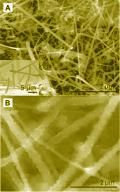Silicon Nanowires Boost Li-ion For 20-hour Notebooks
Stanford (CT) - Researchers at Stanford University have discovered a way to utilize silicon nanowires in in such a way as to reinvent the rechargeable Lithium-Ion battery. This find produces 10x the electricity of existing Li-ion batteries, leading to the 20-hour notebook. The lead researcher is calling it "a revolutionary development".

Note: both images were taken at the same magnification, one before exposure to lithium, the other after.
The silicon swells as it absorbs positively charged lithium atoms during the charging phase. Later, when it's called to give off electricity during use, it deflates back to its smaller size.
History
Silicon battery technology began about 30 years ago. Researchers had been pursuing larger silicon assemblies which would quickly fracture and damage the battery, making for almost immediately decreased output and extremely low battery lifetimes. Cui chose to investigate silicon nanowires because unlike larger silicon structures, they do not fracture. This is true even upon repeated charge/depletion cycles.
The results are so far ahead of what was expected that Cui is looking for additional applications. He would like to see wide use of the new batteries as viable home storage units for rooftop solar panels, electric car batteries which last 10x as long, as well as the traditional uses in cell phones and notebooks for 10x the usable life.
Conclusion
When I interviewed Mooly Eden at Fall IDF 2007 in San Francisco, CA, I asked him if he was aware of any new battery technologies which would significantly impact the usable life of portable devices. He said yes, but refused to comment further about what that technology was. I think we may have found it here.
A battery providing 20 hours of usable notebook life would be enough for two days of business use from 8am - 5pm. It would be enough to watch 6 to 7 movies during plane flights or long trips. And as far as cars go, it could allow future vehicles to drive 1,200 miles instead of just 120 miles on a single charge.
Stay on the Cutting Edge
Join the experts who read Tom's Hardware for the inside track on enthusiast PC tech news — and have for over 25 years. We'll send breaking news and in-depth reviews of CPUs, GPUs, AI, maker hardware and more straight to your inbox.
Technology innovations like this can literally change our world.
Most Popular


